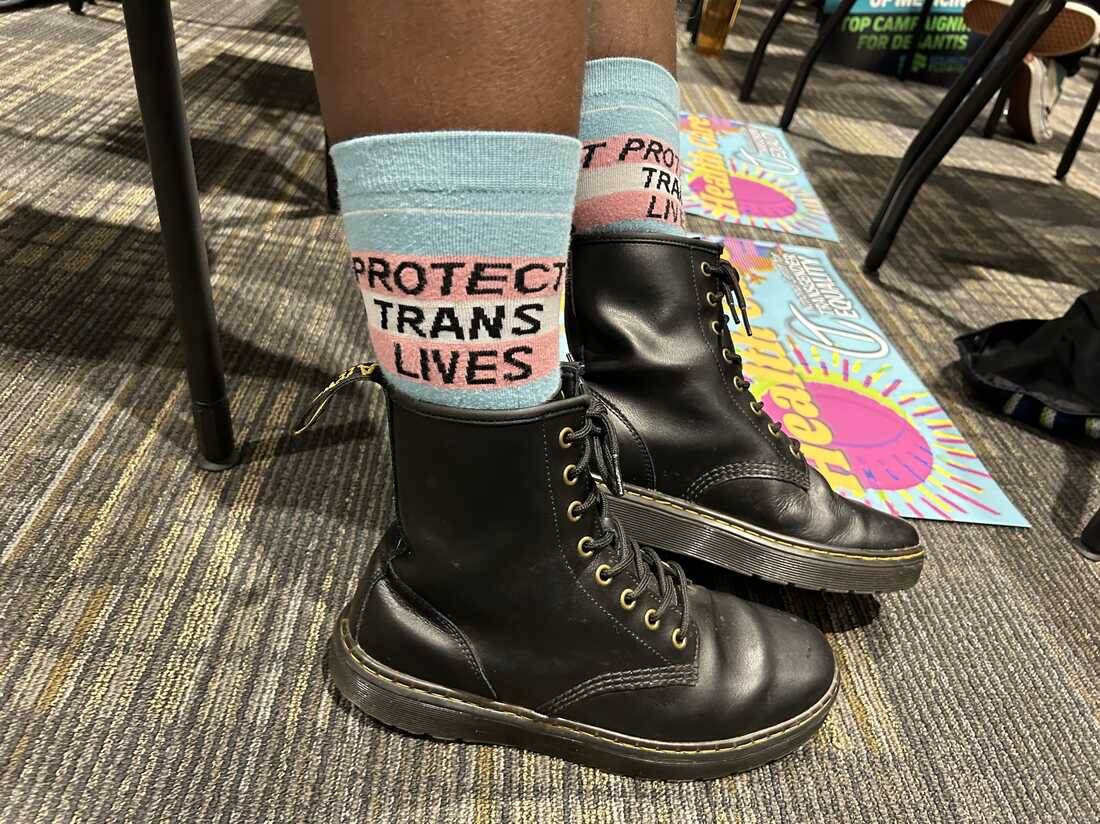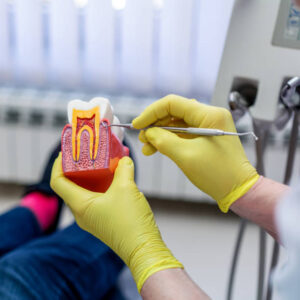Trans-rights supporters filled a meeting of Florida’s medical boards on Feb. 10, 2023 in Tallahassee. The boards voted to approve rules banning gender-affirming care for transgender youth, rules later codified by the state legislature.
Melissa Block/NPR
hide caption
toggle caption
Melissa Block/NPR

Trans-rights supporters filled a meeting of Florida’s medical boards on Feb. 10, 2023 in Tallahassee. The boards voted to approve rules banning gender-affirming care for transgender youth, rules later codified by the state legislature.
Melissa Block/NPR
If you or someone you know may be considering suicide, contact the 988 Suicide & Crisis Lifeline by dialing 9-8-8, or the Crisis Text Line by texting HOME to 741741.
In Florida, families of transgender youth are trying to figure out what a federal judge’s ruling this week means for them.
In scathing terms, Judge Robert Hinkle eviscerated the reasoning behind Florida’s ban on gender-affirming care for trans minors, and he indicated that going forward, the ban will likely be found unconstitutional.
But when he issued his preliminary injunction, Judge Hinkle only listed the three families who filed suit.
That’s caused both confusion and hope for other families, and for the medical providers who treat trans youth.
One family’s dilemma
When Lisa, the mother of a 13-year-old transgender girl in the Tampa area, heard about Judge Hinkle’s ruling, she allowed herself to feel the smallest sense of hope. (Lisa asked that we use only her first name, out of security concerns.)
“You know the expression, ‘there’s a light at the end of the tunnel and I’m almost positive it’s not a train’?” she says with a rueful chuckle. “That’s kind of where we’re at. You know, we got the merest glimpse that it’s not a train, that it’s actual sunlight.”

A trans-rights supporter wears socks reading “protect trans lives” at a meeting of Florida’s medical boards on Feb. 10, 2023 in Tallahassee, Fla.
Melissa Block/NPR
hide caption
toggle caption
Melissa Block/NPR
Florida’s ban on gender-affirming care, such as puberty blockers or cross-sex hormones, carves out an exception for youth who’ve already started receiving those treatments.
That would include Lisa’s daughter, who started on puberty blockers a little over a year ago. But what’s unclear from the law’s language, and from the judge’s ruling, is whether her daughter can now move on to hormone replacement therapy.

“I am hopeful that means we can go ahead and move forward,” Lisa says. “I’m still not 100% sure … If it means the providers putting themselves in danger, then no, we’re going to find other solutions.”
In her case, Lisa says that would mean seeking care for her daughter out of state, possibly as far away as Massachusetts. “Things can change on a dime,” she says. “I’m not ruling anything out. We have seriously been considering relocating.”
‘A hostile landscape’
Critics of Florida’s law say it was written in a way to be deliberately nebulous, designed to stymie care out of fear.
“The state of Florida has created such an impossible situation for these parents,” says Simone Chriss, director of the transgender rights initiative with Southern Legal Counsel, one of the advocacy groups that filed the lawsuit challenging Florida’s ban.
“It’s not only a hostile landscape for their children,” Chriss says, “but it’s also so ambiguous and vague and confusing. And there [are] no clear answers as to what is and isn’t allowed.”
Responding to Judge Hinkle’s ruling, Florida Gov. Ron DeSantis’s office issued this statement:
This injunction is extremely limited in scope. In this case, a single judge has decided that puberty blockers and cross-sex hormones should be made available to three young children. Florida’s law otherwise remains in effect. …
We obviously disagree with the judge’s ruling. We will continue fighting against the rogue elements in the medical establishment that push ideology over evidence and protect against mutilating our kids.

While opponents of gender-affirming care call it experimental and risky, dozens of the country’s leading medical groups, including the American Academy of Pediatrics and the American Medical Association, endorse the treatment as time-tested and medically necessary.
It’s expected the state of Florida will appeal Judge Hinkle’s ruling. According to attorney Chriss, that may explain why the judge worded his injunction the way he did.
“We definitely wish that it went a little further and that he made clear in the order that it applies more broadly,” not just to the three plaintiff families, she says. “But,” she adds, “we’re all very cognizant of the fact that we have a hostile appellate court, and it’s likely that the state will appeal this to the 11th Circuit Court of Appeals. I can’t speak for Judge Hinkle, but I would speculate that he’s trying to be cautious and not go further than necessary so as not to be reversed on appeal.”
Providers also uncertain
So where does this ambiguity leave providers who treat trans youth?
Under Florida’s law, providing gender-affirming care to new patients under 18 is a felony.
Knowing that, should providers risk prison time and risk losing their medical license by assuming that the judge’s injunction also protects them?
“I would never tell a doctor or medical provider to do anything they weren’t comfortable with,” Chriss says. “But we feel confident that if this is enforced against anyone, they should let us know immediately. And we will seek relief from the court,” she says, “because Judge Hinkle has made clear that these are unconstitutional laws and rules.”
For Dr. Michael Haller, a pediatric endocrinologist in Gainesville who treats trans youth, the decision is straightforward. “These patients and their families have gone through a tremendous amount of upheaval and have been used as political pawns over the last couple of years,” he says. “As a white, heterosexual male who’s grown up and lived in the state my whole life, I feel an obligation to do whatever I can to try and protect their rights to receive the care that they feel is appropriate. And if that means that I’m going to have to do things that may push back on the state’s interests, then so be it.”

The legal path forward remains uncertain, Haller admits. “But,” he says, “as a physician, I have to treat the patient in front of me right now. And to be able to have the shackles released even just for a little while and to provide, potentially, relief to patients who need care this minute is a win. And we have to celebrate that.”
Even before the state’s ban was finalized, Haller says, it had a notable chilling effect: A number of Florida clinics stopped providing gender-affirming care to trans youth. Many of those clinics’ patients, Haller says, have been contacting his office, seeking treatment.
“When they don’t have access to care,” he says, “you can hear and feel that desperation – the words they use in their emails, the vibrato of their voice when they call asking for help – you can really just feel it. It’s palpable. I hope that this injunction will give people a little bit of a sense of relief.”
That’s also the hope for Lisa, the mom from the Tampa area, who says her transgender daughter suffers from pretty serious depression.
“At one time,” Lisa recalls, “when she was having pretty deep thoughts of self-harm, she just looked at me and she said, ‘Well, maybe if I’m successful, Florida will be happy.’ And …”
Here, Lisa pauses and lets out a heavy sigh. “That – that was hard to hear,” she continues. “And I – you know, how do you argue with that? Because I live in a red county. I live in a neighborhood specifically full of people who voted for all of these people doing this. And gleefully so. How do you combat that?”
Maybe, Lisa says, this week’s ruling from Judge Hinkle will help provide her daughter some relief. “I’m hoping that it eases her pain,” she says. “I hope that it eases it completely, but even if it’s just a little bit, I’ll be happy.”
If you or someone you know may be considering suicide, contact the 988 Suicide & Crisis Lifeline by calling or texting 9-8-8, or the Crisis Text Line by texting HOME to 741741.
MARY LOUISE KELLY, HOST:
In Florida, families of transgender youth are trying to figure out what a federal judge’s ruling this week means for them. In scathing terms, Judge Robert Hinkle indicated that going forward, Florida’s ban on gender-affirming care for trans minors will likely be found unconstitutional. But when he issued his preliminary injunction, Judge Hinkle only listed the three families who filed suit. That has caused both confusion and hope for other families and for the medical providers who treat trans youth. NPR’s Melissa Block has this report. And a warning to our listeners – her story includes discussion of suicide and mental health.
MELISSA BLOCK, BYLINE: Lisa, the mother of a 13-year-old transgender girl in the Tampa area, says when she heard about Judge Hinkle’s ruling, she allowed herself the smallest sense of hope.
LISA: You know the expression, there’s a light at the end of the tunnel, and I’m almost positive it’s not a train (laughter)? That’s kind of where we’re at. You know, we got the merest glimpse that it’s not a train, that it’s actual sunlight.
BLOCK: Lisa asked that we use only her first name out of security concerns. Florida’s ban on gender-affirming care, such as puberty blockers or cross-sex hormones, carves out an exception for youth who’ve already started receiving those treatments. That would include Lisa’s daughter, who has started on blockers. But what’s unclear from the law’s language is whether she can now move on to hormone replacement therapy. Critics say it’s just one part of Florida’s law that’s deliberately nebulous.
SIMONE CHRISS: The state of Florida has created such an impossible situation for these parents.
BLOCK: Simone Chriss with Southern Legal Counsel brought the lawsuit challenging Florida’s ban.
CHRISS: It’s not only a hostile landscape for their children, but it’s also so ambiguous and vague and confusing. And there’s no clear answers as to what is and isn’t allowed.
BLOCK: In a statement, Governor Ron DeSantis’ office called the injunction extremely limited and said, quote, “we will continue fighting against the rogue elements in the medical establishment that push ideology over evidence.” It is expected the state will appeal. So where does this ambiguity leave providers who treat trans youth? Under Florida law, providing gender-affirming care to new patients under 18 is a felony. Knowing that, should providers risk prison time, risk losing their medical license and assume that the judge’s injunction also protects them? For Dr. Michael Haller, the decision is straightforward. He’s a pediatric endocrinologist in Gainesville who treats trans youth.
MICHAEL HALLER: I feel an obligation to do whatever I can to try and protect their rights to receive the care that they feel is appropriate. And if that means that I’m going to have to do things that may push back on the state’s interests, then, you know, so be it.
BLOCK: Dr. Haller says even before the state’s ban was finalized, it had a chilling effect. A number of Florida clinics stopped providing gender-affirming care to trans youth.
HALLER: And when they don’t have access to care, you know, you can hear and feel that desperation. The words they use in their emails, the vibrato of their voice when they call asking for help – you can really just feel it. It’s palpable. So, you know, I hope that this injunction will give people a little bit of a sense of relief.
BLOCK: That’s also the hope for Lisa, the mom we heard from earlier who told me her transgender daughter suffers from pretty serious depression.
LISA: At one time when she was having pretty deep thoughts of self-harm, she just looked at me, and she said, well, maybe if I’m successful, Florida will be happy. And that was hard to hear. And, you know, how do you argue with that? – because I live in a red county. I live in a neighborhood specifically full of people who voted for all of these people doing this and gleefully so. How do you combat that?
HALLER: Maybe, Lisa says, this week’s ruling from the federal judge will help.
LISA: I’m hoping that it eases her pain. I hope it eases it completely. But even if it’s just a little bit, I’ll be happy.
BLOCK: Melissa Block, NPR News.
AILSA CHANG, HOST:
And if you or someone you know is in crisis, call or text The Suicide and Crisis Lifeline, 988.
Copyright © 2023 NPR. All rights reserved. Visit our website terms of use and permissions pages at www.npr.org for further information.
NPR transcripts are created on a rush deadline by an NPR contractor. This text may not be in its final form and may be updated or revised in the future. Accuracy and availability may vary. The authoritative record of NPR’s programming is the audio record.





